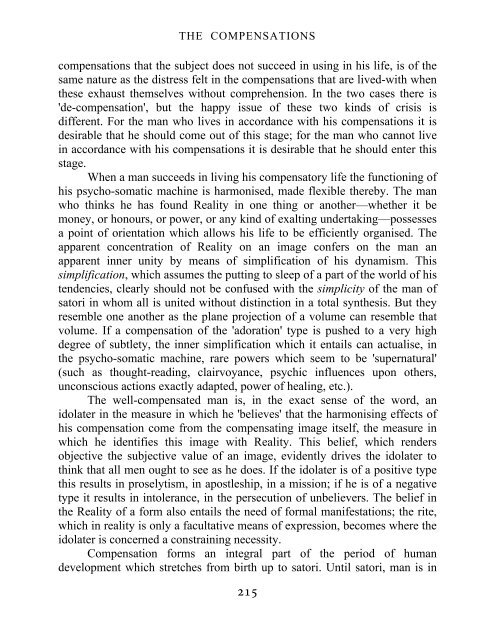The Supreme Doctrine - neo-alchemist
The Supreme Doctrine - neo-alchemist
The Supreme Doctrine - neo-alchemist
You also want an ePaper? Increase the reach of your titles
YUMPU automatically turns print PDFs into web optimized ePapers that Google loves.
THE COMPENSATIONS<br />
compensations that the subject does not succeed in using in his life, is of the<br />
same nature as the distress felt in the compensations that are lived-with when<br />
these exhaust themselves without comprehension. In the two cases there is<br />
'de-compensation', but the happy issue of these two kinds of crisis is<br />
different. For the man who lives in accordance with his compensations it is<br />
desirable that he should come out of this stage; for the man who cannot live<br />
in accordance with his compensations it is desirable that he should enter this<br />
stage.<br />
When a man succeeds in living his compensatory life the functioning of<br />
his psycho-somatic machine is harmonised, made flexible thereby. <strong>The</strong> man<br />
who thinks he has found Reality in one thing or another—whether it be<br />
money, or honours, or power, or any kind of exalting undertaking—possesses<br />
a point of orientation which allows his life to be efficiently organised. <strong>The</strong><br />
apparent concentration of Reality on an image confers on the man an<br />
apparent inner unity by means of simplification of his dynamism. This<br />
simplification, which assumes the putting to sleep of a part of the world of his<br />
tendencies, clearly should not be confused with the simplicity of the man of<br />
satori in whom all is united without distinction in a total synthesis. But they<br />
resemble one another as the plane projection of a volume can resemble that<br />
volume. If a compensation of the 'adoration' type is pushed to a very high<br />
degree of subtlety, the inner simplification which it entails can actualise, in<br />
the psycho-somatic machine, rare powers which seem to be 'supernatural'<br />
(such as thought-reading, clairvoyance, psychic influences upon others,<br />
unconscious actions exactly adapted, power of healing, etc.).<br />
<strong>The</strong> well-compensated man is, in the exact sense of the word, an<br />
idolater in the measure in which he 'believes' that the harmonising effects of<br />
his compensation come from the compensating image itself, the measure in<br />
which he identifies this image with Reality. This belief, which renders<br />
objective the subjective value of an image, evidently drives the idolater to<br />
think that all men ought to see as he does. If the idolater is of a positive type<br />
this results in proselytism, in apostleship, in a mission; if he is of a negative<br />
type it results in intolerance, in the persecution of unbelievers. <strong>The</strong> belief in<br />
the Reality of a form also entails the need of formal manifestations; the rite,<br />
which in reality is only a facultative means of expression, becomes where the<br />
idolater is concerned a constraining necessity.<br />
Compensation forms an integral part of the period of human<br />
development which stretches from birth up to satori. Until satori, man is in<br />
215




